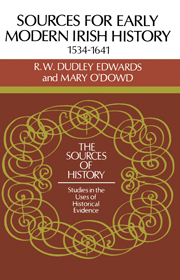Book contents
- Frontmatter
- Contents
- Acknowledgements
- Abbreviations
- Introduction
- 1 IRISH CIVIL CENTRAL ADMINISTRATION
- 2 IRISH CIVIL LOCAL ADMINISTRATION
- 3 ENGLISH AND OTHER CENTRAL ADMINISTRATIONS AND IRELAND
- 4 IRISH ECCLESIASTICAL ADMINISTRATION
- 5 CONTEMPORARY ACCOUNTS AND DESCRIPTIONS
- 6 MAPS AND DRAWINGS
- 7 ARCHIVAL COLLECTIONS
- 8 HISTORIOGRAPHY
- Index
3 - ENGLISH AND OTHER CENTRAL ADMINISTRATIONS AND IRELAND
Published online by Cambridge University Press: 08 January 2010
- Frontmatter
- Contents
- Acknowledgements
- Abbreviations
- Introduction
- 1 IRISH CIVIL CENTRAL ADMINISTRATION
- 2 IRISH CIVIL LOCAL ADMINISTRATION
- 3 ENGLISH AND OTHER CENTRAL ADMINISTRATIONS AND IRELAND
- 4 IRISH ECCLESIASTICAL ADMINISTRATION
- 5 CONTEMPORARY ACCOUNTS AND DESCRIPTIONS
- 6 MAPS AND DRAWINGS
- 7 ARCHIVAL COLLECTIONS
- 8 HISTORIOGRAPHY
- Index
Summary
THE ENGLISH ADMINISTRATION AND IRELAND
English parliamentary declaration of the realm as an empire affirmed the absolute sovereignty of the king. The state was thus asserted to be the authority dominating all others within the realm. The authority was essentially civil, to which ecclesiastical authority was necessarily subordinated. The civil administration was derived from the monarch in whose court its central activities were based. The government was English, as the realm was defined as that of England to whose monarch subordinate entities belonged. These included French areas and the Channel Islands as well as Wales and Ireland. The Irish administration was, therefore, of marginal interest to the English civil, central administration. This section is concerned to indicate briefly those parts of the London administration which were involved with Irish affairs and which produced documentary material referring to Irish matters. By contrast with Ireland, administrative history in England is well established and more detailed information on the institutions noted here can be found in G. R. Elton, England 1200–1640.
English monarchs, ministers and council
The title ‘lord of Ireland’ continued to be employed by successive English monarchs until in 1541 Henry VIII was proclaimed king of Ireland. The change of title, however, made little difference to the way in which Ireland was governed. In the course of the next one hundred years, the kings and queens of England occasionally took a personal interest in Ireland and directed government policy there, but, on the whole Irish affairs were left in the charge of their chief ministers and council.
- Type
- Chapter
- Information
- Sources for Modern Irish History 1534–1641 , pp. 52 - 59Publisher: Cambridge University PressPrint publication year: 1985



